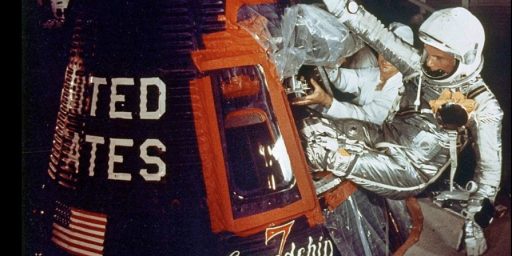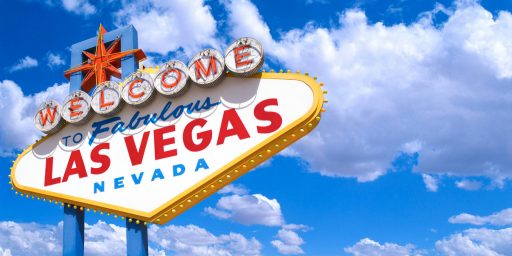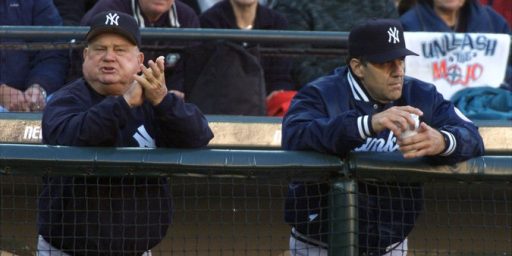Jason Collins Is Not The First Openly Gay Athlete In A Major Sport
In the wake of Jason Collins’s article in Sports Illustrated this week in which he announces that he’s gay, many people are calling him the first openly gay athlete in a major sport. As it turns out, and as was pointed out on Twitter earlier today, this isn’t entirely true. In 1978, Glenn Burke, who played for three years with the Los Angeles Dodgers and Oakland Athletic was out of the closet to at least his teammates and coaches. Here’s what Burke’s Wikipedia entry says on the subject:
Burke said “By 1978 I think everybody knew,” and was “sure his teammates didn’t care.” Former Dodgers team captain Davey Lopes said “No one cared about his lifestyle.”[9] He told the New York Times that “Prejudice drove me out of baseball sooner than I should have. But I wasn’t changing,”[1] and stated in his autobiography that “prejudice just won out.”[5] Burke left professional sports for good at age 27.
“My mission as a gay ballplayer was to break a stereotype . . . I think it worked.” Glenn Burke in People ~ November 1994
Burke was a native of the San Francisco Bay Area and, in 2011, the City of Oakland honored him:
In more than 140 years of professional baseball, over 17,000 players have passed through the major leagues. Only two have been openly gay.
Glenn Burke was the first.
Looking at his stats, there is nothing remarkable about the 225 Major League Baseball (MLB) games played by Glenn Burke. In parts of four seasons with the Los Angeles Dodgers and Oakland Athletics from 1976 to 1979, the outfielder batted a pedestrian .237, stole 35 bases and slugged two homeruns. Despite the numbers, though, Burke has a lasting legacy within the game’s long history.
At an event Wednesday night, the late Burke was honored for his contributions to his sport and community.
“It’s an amazing story,” said organizer Jorge Leon. “I wanted to make sure people knew about it.”
(…)
Burke is the only player to have been openly out—to his teammates and coaches, at least— during his playing career. Outfielder Billy Bean (not to be confused with A’s general manager Billy Beane), spent parts of six MLB seasons with the Detroit Tigers, Los Angeles Dodgers, and San Diego Padres, came out publicly in 1999, four years after retiring.
Although Burke didn’t publicly acknowledge his sexual orientation until 1982, the documentary includes interviews with former friends and teammates explaining that Burke’s homosexuality was not a secret. During his time with the LA Dodgers, general manager Al Campanis offered to pay for a lavish honeymoon if Burke agreed to marry a woman. He refused. The documentary also points to Burke’s relationship with Dodgers manager Tommy Lasorda’s son as the reason he was traded to the Oakland A’s after the 1977 season. With his new team, Burke was openly called “faggot” by manager Billy Martin.
According to the documentary, the tension created by Burke’s openness directly contributed to his abrupt retirement from the game at 27.
After leaving baseball, Burke settled into San Francisco’s Castro District, where he was hailed as a hero of the gay community after making several media appearances to tell his story. But without the stability of the game, Burke got caught up in the area’s party lifestyle and the remainder of his life unfolded in a series of tragic events. In 1987, his foot and leg were shattered when he was hit by a car. After the accident, Burke developed a severe cocaine addiction and was briefly imprisoned for drug possession and grand theft. Following his release from prison, Burke spent several years living on the streets before succumbing to AIDS-related complications in 1995
Times were very different in the late 70s, of course, and Burke being publicly gay would have likely garnered a very different reaction than Collins is likely to receive for his announcement today. Nonetheless, he shared more about his life with those he worked with than most people in his situation would have at the time and, for the most part, it seems as though they were perfectly fine with it. Well, except for Billy Martin I guess.






Most people don’t realize that Jackie Robinson wasn’t the first black major leaguer either. He was the first in several decades.
Not sure if teammates knowing really qualifies. In fact, Jason Collins doesn’t qualify as an openly gay active player either unless a team picks him up for next season.
And, I hasten to add, Jason Collins is not technically an active NBA player. He’s a free agent who’s not currently on any team’s roster.
My father, a life long Mets fan, told me that the entire Yankees team, from the owners to the bat boys, were gay. And this was in the early 1980s.
I don’t care if he’s a basketball, football or any other sport star. People should be proud of who they are and not be afraid just because those games are supposed to be ‘manly’ for lack of a better word. Being gay doesn’t stop anyone from competing in any sport and if others don’t like the fact they are gay tell them to take a hike!
What about Greg Louganis? Granted he came out in 1994, after his Olympic career was over, but he didn’t leave athletics.
@CSK:
True, but diving is an individual rather than a team sport. I also wouldn’t call it a “major” sport in the way that football, baseball, basketball, and hockey are.
David Kopay came out in 1975, though he was retired from football at the time.
If I recall correctly, I think former NBA player John Amechi played professional basketball briefly in Europe after he came out.
English soccer player Justin Fashnau came out in 1990. His story does not have a happy ending:
http://en.wikipedia.org/wiki/Justin_Fashanu